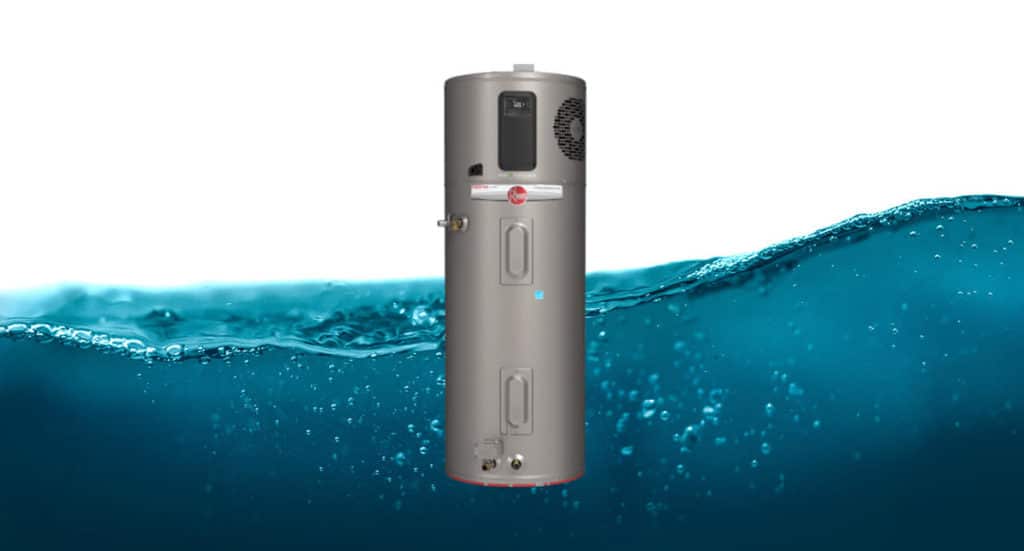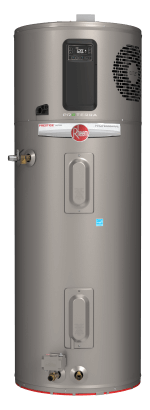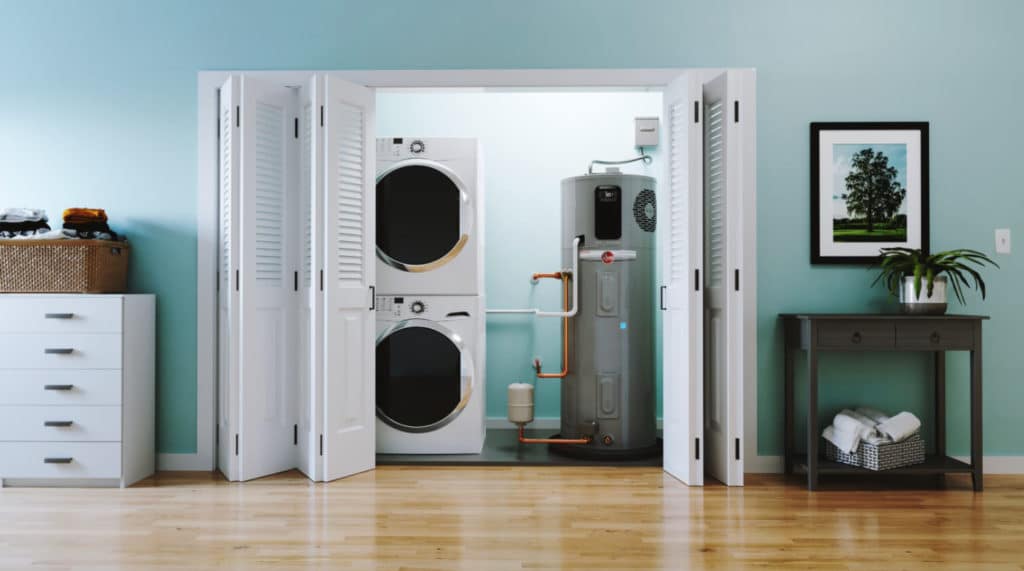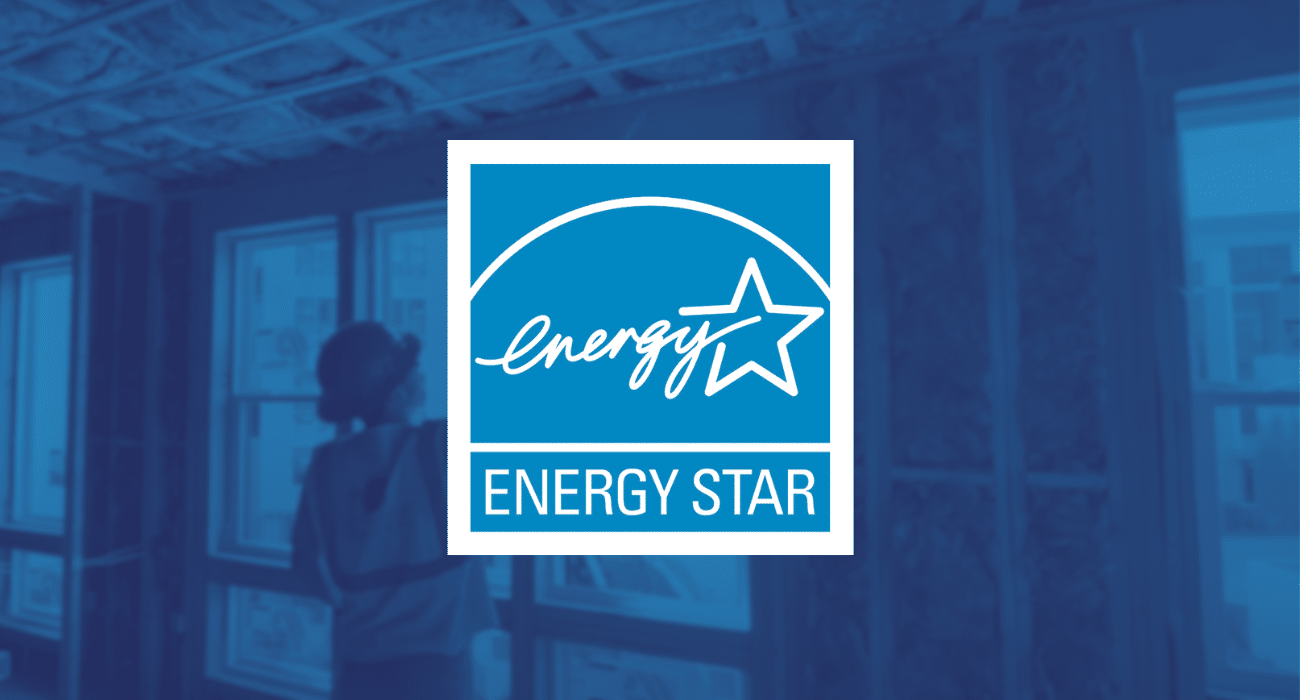- Lindsay Brecheisen
- Olin Ward
- August 3, 2021
- 7 Minute Read
Topics in This Article
What type of water heater is most energy efficient?
The type of water heater you install can significantly impact your home’s energy consumption and savings. It can also help or hurt (< let’s avoid this one) your home’s ability to meet code for building performance programs and incentives.
Fuel source, gas versus electric, is a limiting factor when installing a water heater. Fuel switching can be expensive, so it is recommended that you stay with your current water heater fuel type. If your current water heater is gas, a high efficiency tankless gas unit is a great option for energy savings. Electric water heaters are efficient but can increase utility costs and the demand on the electric grid.
There is a third option, a hybrid electric water heater. With the highest efficiency of any water heater available, it is a fantastic choice for all electric homes and builders trying to offer a very efficient home while maximizing their HERO incentives.

Help from the pros!
Before we dive into it, let’s introduce our water heater pro, Olin Ward from Rheem Water Heating, to help answer our questions. Olin is a Regional Sales Manager for the Southeast + Southwest and has been with Rheem Water Heating for just about 30 years (congrats!). Olin has taken on many roles within the company throughout his time there, but he focuses on utilities, builders, and high-efficiency products in this current position.
A little about Rheem
Founded in 1925, Rheem is currently the only manufacturer in the world that produces heating, cooling, water heating, pool & spa heating, and commercial refrigeration products. Rheem is the largest manufacturer of water heating products in North America.
Sustainability side note: The Rheem team also has some exciting sustainability goals in progress – like designing for zero waste! Check out their Sustainability Report.
What is a hybrid electric water heater?
An air-source hybrid electric water heater works much like a refrigerator in reverse. The heat pump extracts heat from warm air, intensifies the heat with a compressor, delivers the heat to the water, and exhausts the cooler air. Because it uses the warm, ambient air temperature to do most of the work, it is a very efficient way to heat water.
It’s called “hybrid” technology because it can tap into the heating power of an electric element if needed, offering customizable efficiency and dependable, powerful hot water delivery. Many units have different operating modes to customize the balance between performance and efficiency.
Why would a builder / homeowner want a hybrid electric water heater?
Builder
A hybrid electric water heater cost-effectively improves HERS scores and helps homes qualify for incentives (more on this below), all without compromising comfort. A win-win!
Homeowner
Hybrid electric water heaters are the most efficient water heaters available. The high energy cost savings often lead to payback in under two years. And seamless operation means homeowners don’t need to choose between sustainability goals and enjoying hot water— you can do the right thing without giving up comfort.
Any particulars that folks should be aware of before transitioning to a heat pump water heater (HPWH)?
- HPWHs produce non-acidic condensate, so they must have a condensate drain installed.
- When the unit is in heat pump mode, the sound produced is equivalent to a box fan.
- Many units are duct-ready and must be ducted when placed in a room smaller than 700 cubic feet.
What is the recommended installation location?
- In our climate zones (3 & 4), a garage makes for a suitable location.
- Many manufacturers have room area and clearance requirements, so always consult your manufacturer’s spec sheets for applicable information.
*Remember that the byproduct of the HPWH is cool, semi-conditioned air, and the heat pump is audible (when in operation).
Are there unique maintenance requirements for homeowners to be aware of?
- Monthly air filter cleaning
- Annual tank draining to reduce sediment
- Condensate drain flushing when needed
Can you speak to how the recovery time of these HPWH units compares to traditional electric tanks?
Because many Hybrid Electric tanks have a backup electric heating element, the recovery is similar to a standard electric water heater of similar capacity. If you rely solely on the heat pump to refill the tank, recovery times can be slightly longer than a traditional tank.
What are the efficiency gains of a heat pump water heater?
From an environmental perspective, hybrid electric water heaters offer the highest efficiency on the market and feature an efficiency of up to 4.0 UEF (Uniform Energy Factor). This UEF value is up to 4 times the efficiency of any standard electric tank-type water heater available on the market today.
What is a Uniform Energy Factor (UEF)? And why does it matter?
The Uniform Energy Factor is the newest way to measure the overall efficiency of a residential heat pump water heater. The higher the UEF value is, the more efficient the water heater.
A test method from the Department of Energy determines UEF.
How does a hybrid electric water heater impact HERS scores?
It can vary based on energy factors but generally speaking, you’re looking at a 6-7 point improvement to HERS scores, when compared to a standard electric water heater.
What about the kWh impact?
The kWh impact of a hybrid electric water heater will vary by model but generally can save up to 2,500 kWh annually. That equates to roughly $315 or more in annual savings.
What impact does a hybrid electric water heater have on HERO incentives?
Anywhere from an additional $2,000-$2,200 to your baseline average! Plus, homeowners may be eligible for federal tax credits.
Any indirect benefits to home health, comfort, and efficiency?
The heat pump exhausts cold air as a byproduct that can be strategically ducted to help with dehumidification, which is critical to have in our climate zone. Always consult your HERS rater and/or HVAC trade for options to integrate this into your design.
How does the cost + efficiency compare with some of the more traditional units on the market?
| Standard Electric Water Heater | Rheem ProTerra Hybrid Electric | |
|---|---|---|
|
Uniform Energy Factor (UEF) |
0.93 | 3.45-4.0 |
| Retail Cost - 50 Gallons | $400-500 | $1,100* |
| Average Annual Operating Cost | $419** | $104** |
* In many cases, there are tax credit, rebate, and incentive programs in place that will offset the cost delta to upgrade to a hybrid electric water heater.
** Annual Operating costs are based on 40 and 50 gallon hybrid electric 30 AMP models compared to standard electric models of similar capacity with minimum efficiency. Average operating costs vary by model.
What are some unique features of Rheem’s ProTerra line:
- Demand Response Ready—Built-in CTA-2045 port easily connects to utility programs for additional energy cost savings (Note: this is not currently applicable in NC or SC)
- Time of use scheduling—Save over the life of the heater with peak and off-peak energy rate scheduling. Contact your utility company for rate details.
- Econet app: The ProTerra line features compatibility with Rheem’s proprietary EcoNet® app that allows users to adjust the tank temperature and operating modes remotely, set custom schedules around peak electricity rates, and view an energy usage tracker to manage consumption without sacrificing comfort. Also, with the EcoNet® app, users can access Rheem’s Hot Water Availability feature that indicates how much hot water is available in the tank, preventing any cold shower surprises (the worst).
- Leak detection: The ProTerra Hybrid Water Heater with LeakGuard™ is the industry’s first hybrid water heater with built-in leak detection and auto-shutoff, limiting water loss from the tank to no more than 20 ounces.
- ProTerra’s high-efficiency features also present homeowners with a cost savings benefit of up to 76% annually. The line is also recognized as “Product of the Year” by Green Builder Magazine and a Gold award in the Sustainability category of the 2021 Edison Awards.
What's Next?
Thanks, Olin, and the Rheem team, for taking us through this deep dive into hybrid electric water heaters! We hope you found it helpful to learn more about how this type of water heater technology can help your home save money on energy bills and qualify for program incentives without compromising your love of hot water!
Click here for other ways to build more cost-effective and efficient homes in 2021!
Still have questions about adding hybrid electric water heaters to your high-performance strategy? Give us a call or schedule a meeting! We’d be happy to help you get on track.
Ready to Get Started?
Schedule a meeting with us today to review your home performance goals and challenges.
About Us
North Carolina’s solar power and building performance expert. Founded in 2001, we’ve worked for 20+ years to improve the way people make and use energy.



















